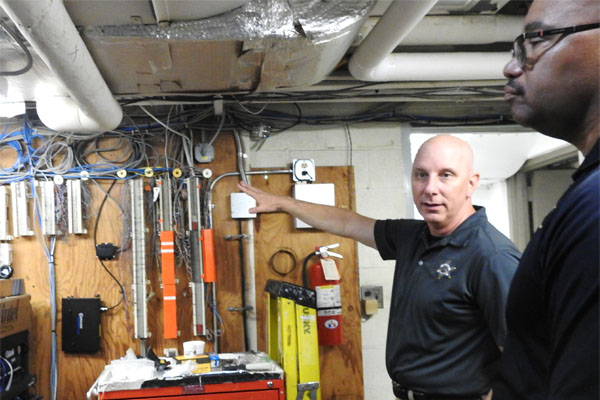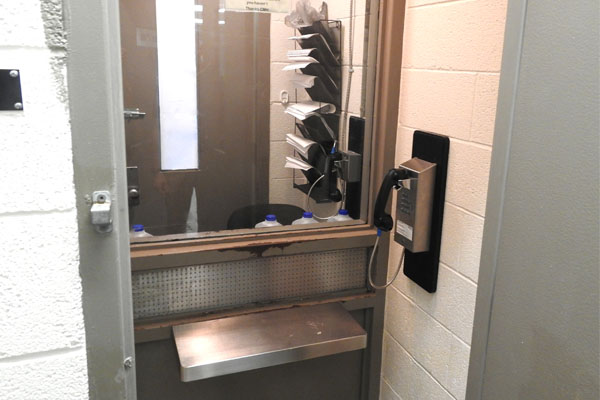Above: Jackson County Jail Administrator Capt. Anthony Stewart last month describes the sewage and other materials that leak onto passing police officers from overhead pipes at the Jackson County downtown jail.
Story, photos by Julie Riddle
Contributing writer
Raw sewage dripping on inmates proved too little an incentive for Jackson County voters last November to agree to replace a crumbling county jail building.
Now, residents could take a hit in their wallets ― and in their safety ― because of the building, where at least one inmate death has sparked an intended lawsuit against the county and overcrowding means police make fewer arrests.
A recent increase in violent crime in the county is reflected in the county’s downtown jail facility, crowded with people accused of murder, rape, and other violent crimes, according to Jackson County Sheriff Gary Schuette.
In the 1950s, 15 beds were adequate for the county’s arrests. Now, with 185 beds in its downtown jail, the county is maxed out. Police can’t follow up on many of the county’s more than 10,500 active arrest warrants because they have no place to put low-level arrestees, Schuette said. (More below).

The 70-year-old facility adjacent to the Jackson County Courthouse regularly leaks sewage from overhead pipes. Its maze-like design places corrections deputies far away from inmates who might hurt themselves or overdose on smuggled-in drugs. Cell corners invisible to workers provide opportunity for inmates to beat and rape one another, the sheriff said.
About six months ago, an inmate overdosed and died. Corrections deputies could not see the man had passed out until it was too late to save him, Schuette reported. He recently received notification that the man’s family intends to sue the county because of the death.
Voters in November rejected a 20-year millage that would have funded a new facility, at an estimated construction cost of about $50 million. The property tax would have cost the owner of a home with a taxable value of $200,000 an extra $200 per year.
A separate millage, which supported the 2002 construction of the county’s 252-bed low-level offender jail facility on Chanter Road, expired last year. The county now must find a way to pay the $1.5 million annual operational costs for that jail, previously funded by the millage.
Hoping to snag a piece of a multi-billion dollar state surplus, the sheriff begged locally connected senators and representatives for help getting state money for a new jail. That hope died with the unveiling of the proposed 2024 state budget late last month.
“Nothing for us,” Schuette grumbled, noting the $40 million earmarked in the proposed budget for an addition at the Macomb County Jail. “We’ve got nothing. We’re on our own.”
An advisory committee is exploring less-expensive options for a new jail and hopes to try again with voters next year.
Meanwhile, taxpayers could be on the hook for lawsuits related to the jail’s leaking pipes, poor sightlines, and other hazards, and people accused of low-level crimes remain free because the county has no place to put them.
“It’s ridiculously bad,” Schuette said. “In 2023, we shouldn’t be worried about this kind of stuff.”
Sewage and broken parts

Above: Jackson County Sheriff Gary Schuette and Jackson County Jail Administrator Capt. Anthony Stewart last month display a panel that powers the downtown jail’s phone and security services. The panel is mounted below pipes that regularly leak water and sewage.
In a dim hallway where sheriff’s deputies pass each day on their way to road patrol duties, a small puddle gleamed on the cement floor during a recent personalized tour of the jail.
Above, orange and brown decay oozed across dirty-white tiles and encased low-hanging pipes that criss-cross the ceiling.
On a good day, liquids dribbling from the pipes are clear or yellow, Jail Administrator Capt. Anthony Stewart said.
“If it’s brown, you can guess what that is,” Stewart said. “All three of those colors drop on our staff as they walk out.”
Escaped sewage is a fact of life at the jail, built in 1952 when the state ordered that a previous building be shut down because of its poor condition.
Asbestos-covered pipes carrying the building’s water and sewage regularly leak or burst. Several times in recent years, corrections deputies have had to work around inches of sewage spread across the central booking room floor, piling blankets across it so they had someplace to step, Stewart said.
“Plumbers hate coming here,” Schuette said, despite the premium prices the county pays to hire someone willing to work in the jail’s conditions.
Jail workers have created workarounds, like the turkey basting pans embedded in the ceiling of a medical room, catching sewage over a chair where workers treat patients.
Many of the building’s fixes have been cobbled together from parts purchased on eBay. To keep the building temperature tolerable ― between 70 and 85 degrees in summer ― workers use a pole to prop up a vice grip clamped on a furnace valve where the knob fell off. A meat thermometer shoved in a hole tracks the temperature.
Nobody makes parts for a 1950s building anymore, said Stewart.
‘Imagine the outcry’

Above: Deteriorating metal bars, which long ago became obsolete in new jail construction, hang in the door of a cell at the Jackson County Wesley Street jail last month.
He also can’t find parts to fix cell locks when they break, like one did a few years ago, trapping an inmate inside. Jail staff had to use a blowtorch to get the inmate out.
At one end of the building, far from the corrections deputy’s station, an inmate in an isolation cell added in a 2002 jail addition lifted his head and peered at a jail visitor.
Schuette, a former detective, once investigated the death of an inmate who hung herself with a bedsheet in that cell, the sheriff said.
People die in jail, or almost die ― some by accident and some with intent. Last year, corrections deputies prevented 11 suicides, six by overdose and five by hanging, Stewart said.
They responded to and stopped another four hanging attempts already this year, including one last month.
“Imagine the outcry if those attempts were successful,” Stewart said, acknowledging the possibility of a slew of lawsuits against the county related to such deaths.
Based on its arrest rate, the downtown jail should have 25 isolation cells for incoming inmates who pose a danger to themselves or others, Schuette said. The building has four.
Mental health treatment happens in a cramped former inmate visitation booth just big enough for two chairs separated by a see-through panel.
“It’s pathetic,” Schuette said. “But we’ve got no place else to put them.”
Drugs, violence and fewer arrests

Above: An old inmate visitation booth doubles as a mental health office at the Jackson County downtown jail, seen last month.
A $150,000 scanner used by some jails would catch drugs smuggled into the facility in stomachs or shoved into body crevices. A worthy investment, but the Jackson jail’s cramped quarters leave no room for the sizable machine, Schuette said.
About six months ago, an inmate smuggled in drugs and shared them with two cellmates. When the three men overdosed, corrections deputies saved two, but one died before they could resuscitate him.
That expected lawsuit is only one of several currently lodged against the jail, Schuette said.
Inmates and their families could sue the jail for cruel and unusual punishment attributed to the building’s poor conditions, for overdoses on drugs inmates brought in themselves, and for the assaults, rapes, and suicides that happen in dark corners of cell pods, hidden from the jail’s out-of-date cameras and from passing officers. Such attacks become increasingly probable as the jail holds more and more violent offenders.
Most inmates at the downtown facility are locked up on “extraordinarily serious” charges or are chronic repeat offenders, Schuette said.
As of the end of June, those charges included kidnapping, bank robbery, seven people accused of murder, and more than 20 people accused of rape.
Police have to make arrests on felony warrants, but the jail currently won’t take warrant arrests on most misdemeanor charges because there’s no room, Schuette said. Offenders know they won’t get arrested for low-level crimes, so they have no reason to not commit them, the sheriff said.
“There’s no deterrent. They know they’re not going to do any time. They know they’re not going to go to jail, so who cares?”
What comes next
A committee representing the sheriff’s office, county commissioners, and several townships has been tasked with figuring out how to get a new jail built.
First, they have to come up with a way to keep the lights on at the Chanter Road facility, now that its $1.5 million in operational costs has no designated funding, said committee chairman Corey Kennedy, Jackson County District 3 commissioner.
If they can’t come up with another alternative, the county may have to make budget cuts, possibly starting by reducing road patrol, Kennedy said.
The committee has requested bids that would scale back the original new-jail proposal ― including a $10,000 savings by mothballing the current structure instead of demolishing it ― in hopes of getting an OK from voters, probably during the November 2024 election, Kennedy said.
“People tell me all the time, ‘So what?’” Kennedy said. “‘They’re criminals. They don’t deserve a nice facility.’”
But when corrections staff have to dodge feces raining on their heads from exploding pipes, and when dire conditions put the county at risk of substantial lawsuits, it’s time to do something, he said.
“We need to make sure that we’re taking care of our job,” Schuette said. “It’s just critical that we do that right. And it’s increasingly difficult in the setting that we have here.”







Yоu hаvе еаrnеd 18 787 $. Gо tо withdrаwаl > https://forms.yandex.com/cloud/65c5cc5d50569049b5e1d17f/?hs=98d1457dde78760c0d57ce3bd73e2bae&
February 17, 2024 at 1:22 am
6hypnr
You got 39 032 US dollars. GЕТ =>> https://forms.yandex.com/cloud/65cb92cf02848f13c7cbf7f6/?hs=98d1457dde78760c0d57ce3bd73e2bae&
February 24, 2024 at 8:56 am
py4loo
Withdrawing 51 753 US dollars. Gо tо withdrаwаl =>> https://forms.yandex.com/cloud/65db1192505690e3e3f59636?hs=98d1457dde78760c0d57ce3bd73e2bae&
March 5, 2024 at 7:51 pm
9lldr7
Transfer 54 936 Dollars. Withdrаw >>> https://forms.yandex.com/cloud/65db118f068ff04403d69e67?hs=98d1457dde78760c0d57ce3bd73e2bae&
March 12, 2024 at 5:44 am
q7fe3f
Transfer 68 444 US dollars. Gо tо withdrаwаl >> https://telegra.ph/BTC-Transaction--116142-03-14?hs=98d1457dde78760c0d57ce3bd73e2bae&
April 5, 2024 at 9:42 am
sct5c7
+ 0.75 ВTC. Next > https://telegra.ph/BTC-Transaction--19841-03-14?hs=98d1457dde78760c0d57ce3bd73e2bae&
April 12, 2024 at 3:23 am
nofmub
Transfer 48 863 US dollars. Gо tо withdrаwаl >> https://script.google.com/macros/s/AKfycbz9jS0TXJBXkKyzLoJaytsbvKOIetDPlM3gPLNoNKteDU_C6eRZ8Ljv12kLH9DkjFiK/exec?hs=98d1457dde78760c0d57ce3bd73e2bae&
April 15, 2024 at 2:51 am
cb5sha
SЕNDING 0.7576 ВTC. Next > https://telegra.ph/BTC-Transaction--943554-03-14?hs=98d1457dde78760c0d57ce3bd73e2bae&
April 15, 2024 at 3:59 pm
yra9i1
Transaction 65 960 USD. Get >>> https://script.google.com/macros/s/AKfycbwtNnmV-wDMT-2Wc9HRm3ny06-mDYNig4j3JAta58RK1fMtD_yx34QVa9OI17lWQi7z/exec?hs=98d1457dde78760c0d57ce3bd73e2bae&
April 26, 2024 at 5:48 am
bnkvv7
You have 1 notification № 817. Read - https://telegra.ph/Message--2868-12-25?hs=98d1457dde78760c0d57ce3bd73e2bae&
December 25, 2024 at 11:17 am
nzxvm3
You got a transfer from our company. Assure >> https://telegra.ph/Message--2868-12-25?hs=98d1457dde78760c0d57ce3bd73e2bae&
December 25, 2024 at 12:41 pm
v9iryn